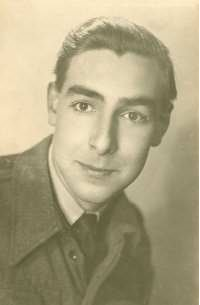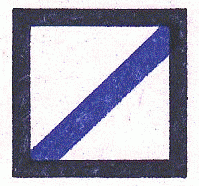This article used to be on the Crewe and Nantwich Borough Council website. However Crewe and Nantwich Borough Council ceased to exist on April 1st 2009 and their website was decommissioned. The article can not be found via the Cheshire East Council website which replaced the Crewe and Nantwich Borough Council website.
Luckily, I took a copy of the article after I first saw it and have taken the liberty of re-publishing it as I believe it should continue to be seen.
ARNOLD PALIN
12 Singleton Avenue, Crewe
Arnold volunteered for the Royal Air Force in 1943 and after his initial training, he was posted to Blackpool to train as a wireless operator. He passed the course, but much to his disappointment; he failed the medical for the air crew. He was then posted to Combined Operations.


Early in 1944, Arnold found himself attached to the American 1st Division (The Big Red One), his job being Ground to Air Communications. It was in that role that he landed on ‘D’ Day on Omaha Beach in Normandy. He was in one of the first waves of landing craft but as we now know the Americans were not able to get forward from the beach for some hours.
All that Arnold and his American colleagues could do at this time was to get under whatever cover was available to them. This happened to be their own truck which contained all their radio equipment. It was soon clear that it would be safer to be further along the beach, so they made a dash for the next vehicle a few yards away. Arnold was the first to scramble under the truck with the Americans crowding behind him, but almost instantly, a mortar round hit the truck that they had just left and the explosion killed the American lads and wounded Arnold in the left knee.
At the time and in the circumstances, he did not think much of it, his only thought being to get off the beach as there was no way back. When the American’s eventually began to force their way off the beach he decided to go with them, even though he had lost his radio equipment and as a result would not be of much use. It was clearly safer than remaining on the beach. His knee was not troubling him at the time.
He attached himself to a group of Americans and moved inland with them for a few days, but in the end his leg gave out and he could no longer walk on it. An American Parson found him laying by the side of a road and he stopped a truck so that Arnold could be transported back to the beach.
He was eventually put aboard the Royal Navy landing craft that was taking the wounded back to England and he said that when the crew found that he was English, they made a fuss of him because he was the first British Serviceman that they had taken off the beach in the three days that they had been operating there.
After he had been in hospital in Blackpool for about eight weeks, he got his first leave. He looked quite a hero. He still wore the RAF battle dress that he had worn when he landed in France. It had been washed and the hole in the knee of the trousers had been darned. He had not been able to get a new uniform because the stores at the hospital had no RAF uniforms. On the sleeve of his blouse he wore the RAF Albatross, the Wireless Operators’ trade badges and a brass wound badge on his cuff. He walked with a stiff leg and had to use a walking stick. He was still in a lot of pain and had been told that he would have to have more operations, but even so, he had a good leave. He got into the dances and the cinemas free, the usherettes made sure that he always had an end seat and that the seat in front was kept empty to enable him to stretch out his long legs.
After his leave, he was off back to Blackpool for more operations. Like a lot more young men in war time, he fell in love with one of the nurses. On his next leave, he brought her home with him. He was so proud of her as she was his first girlfriend.
Early in 1945, he was discharged from hospital as fit for service. He was posted to an American Airfield in Belgium and he kept on the move with them through France, and then into Germany where he was on V.E. Day. I received a letter from him posted on that day telling of his hopes for the future and saying how much he hoped that he would be home for his 21st birthday. Some days later, his mother received a telegram to say that he had been killed on 11th May 1945.
Arnold’s American Commanding Officer wrote to his mother and told her that he had gone to see a dentist some miles away. When he arrived back at the camp, he had jumped out of the cab of the lorry that he was travelling in and had stumbled and fell. The but of the Sten gun that he had been carrying had hit the ground and had fired, hitting him in the head. He died instantly and was buried in a temporary American Cemetery. Later, he was transferred to a British Military Cemetery just over the border in France.
I am proud to say that I have Arnold’s medals in my collection, the 1939-45 Star, France and Germany star, Victory medal and also the badges that he wore on his battledress on D-Day. I have often wondered, if there were any other British Servicemen on Omaha Beach? Arnold never spoke of any, and in his letters after he went back to the continent he wrote only of ‘his American Friends’.
Information provided by Mr P Kirkland, Haslington

2 replies on “A British Airman on Omaha Beach”
Yes there were other RAF personnel who landed over Omaha including elements of 21 Base Defence Sector and one of its units No 15082 GCI. Personnel from these units won four MCs and two MMs. There is a memorial to those killed at Vierville sur Mer
Thanks Tim – and there is more information at http://www.therafatomahabeach.com